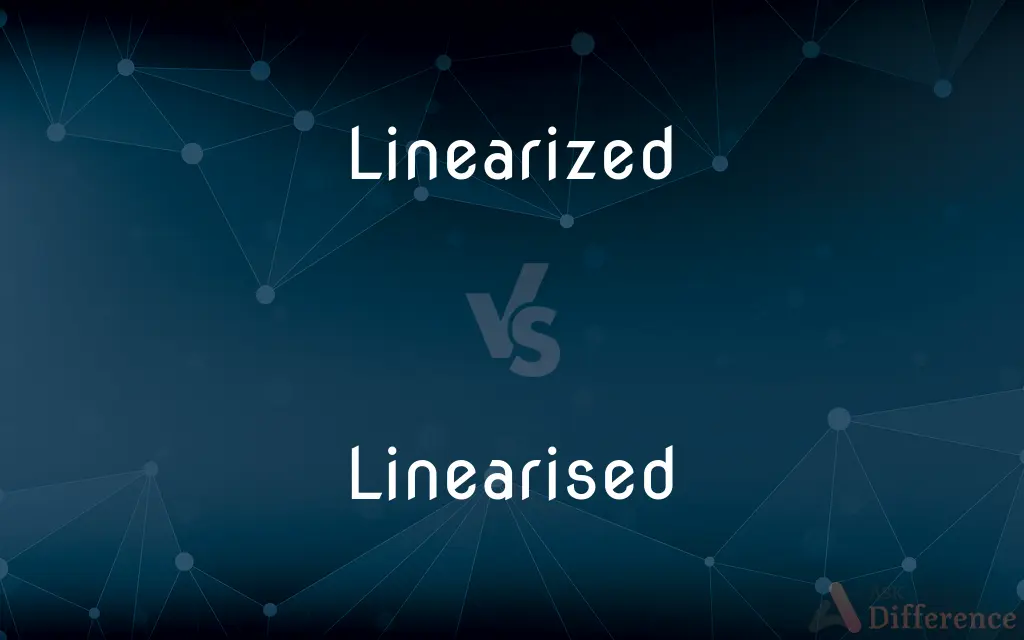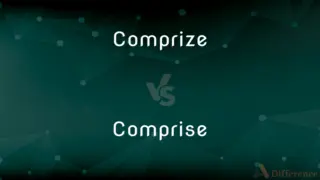Linearized vs. Linearised — What's the Difference?
By Tayyaba Rehman & Maham Liaqat — Updated on May 8, 2024
"Linearized" and "linearised" are variant spellings of the same term, with "linearized" being the preferred form in American English, while "linearised" is commonly used in British English.

Difference Between Linearized and Linearised
Table of Contents
ADVERTISEMENT
Key Differences
"Linearized" is commonly used in American English to describe the process of approximating a nonlinear system by a linear equation. "Linearised," on the other hand, is the spelling preferred in British English, though the meaning—simplifying complex equations to linear forms—remains the same.
In technical contexts such as engineering or mathematics, "linearized" is the form you will frequently encounter in American journals and textbooks. Meanwhile, "linearised" appears in British publications and materials, emphasizing the regional spelling preferences.
The usage of "linearized" in software and programming often aligns with American English conventions, especially in code and documentation for international software. Conversely, "linearised" may appear in academic papers or books that adhere to British English guidelines.
When discussing the technique in educational settings, American universities and courses might use "linearized" in their curriculum. In contrast, British and Commonwealth countries' institutions likely refer to the concept as "linearised" in their syllabi.
Comparison Chart
Preferred Region
United States
United Kingdom, Commonwealth
ADVERTISEMENT
Usage in Academia
Common in American institutions
Common in British institutions
Spelling
-ized ending
-ised ending
Documentation
American technical documents
British technical documents
Programming and Software
Often used in American-developed software
Used in British-developed or international software with British English settings
Compare with Definitions
Linearized
Pertains to linear approximation in mathematics.
Linearized models help predict system behaviors under small perturbations.
Linearised
Pertains to linear approximation in mathematics (British spelling).
Linearised versions of the equations were used during the lecture.
Linearized
Applied in statistics to represent linear regression models.
The data was linearized to fit a straight line trend.
Linearised
Used in engineering to describe simplifying assumptions (British spelling).
We linearised the thermal dynamics for the simulation.
Linearized
Made linear or presented in linear form.
The equations were linearized to simplify the complex system.
Linearised
Made linear or presented in linear form (British spelling).
The complex feedback loop was linearised for the analysis.
Linearized
In scientific computing, refers to the process of making an algorithm or model linear.
The nonlinear differential equations were linearized to facilitate easier numerical integration.
Linearised
Applied in statistics to represent linear regression models (British spelling).
The variable interactions were linearised to simplify the model.
Linearized
Used in engineering to describe simplifying assumptions.
The bridge's stress analysis was linearized for the initial calculations.
Linearised
In scientific computing, refers to the process of making an algorithm or model linear (British spelling).
The software's calculation method was linearised to improve processing speed.
Linearized
To put or project in linear form.
Linearised
Simple past tense and past participle of linearise
Linearized
Simple past tense and past participle of linearize
Linearised
Alternative spelling of linearized
Linearized
Made linear, or treated in a linear manner.
Common Curiosities
What does it mean to linearize a system?
To linearize a system means to approximate it using linear equations or expressions.
Are "linearized" and "linearised" interchangeable?
Yes, they are interchangeable but depend on regional spelling preferences.
What fields commonly use linearized equations?
Fields like engineering, physics, economics, and mathematics commonly use linearized equations.
Is there a difference in pronunciation between "linearized" and "linearised"?
No, both words are pronounced the same despite the different spellings.
Why use linearized models?
Linearized models simplify complex systems, making them easier to analyze and solve.
Can I use "linearised" in American publications?
It's advisable to use "linearized" in American publications to align with regional spelling norms.
What software tools are used for linearizing models?
Software like MATLAB and Simulink often provide tools for model linearization.
Are there any online resources for learning how to linearize equations?
Yes, many educational websites and online courses offer tutorials on linearizing equations.
Can linearization be applied to all nonlinear equations?
Not all nonlinear equations are suitable for linearization, especially if the nonlinearity is significant.
Do textbooks differentiate between "linearized" and "linearised"?
Textbooks typically stick to one spelling based on the publication's regional language norms.
What is a linearized control system?
A linearized control system is a simplified version where nonlinear dynamics are approximated as linear for easier control design.
How do you linearize a nonlinear equation?
Linearizing involves approximating a nonlinear equation by a linear one, usually around a point of interest.
What academic courses cover linearization techniques?
Courses in control systems, dynamics, statistics, and applied mathematics often cover linearization techniques.
Is linearization used in machine learning?
Yes, linearization techniques can be applied in machine learning, especially in simplifying complex models for analysis.
What are the limitations of linearized models?
Linearized models may not accurately represent real-world systems under large-scale or high nonlinearity conditions.
Share Your Discovery

Previous Comparison
Comprize vs. Comprise
Next Comparison
Justify vs. DefineAuthor Spotlight
Written by
Tayyaba RehmanTayyaba Rehman is a distinguished writer, currently serving as a primary contributor to askdifference.com. As a researcher in semantics and etymology, Tayyaba's passion for the complexity of languages and their distinctions has found a perfect home on the platform. Tayyaba delves into the intricacies of language, distinguishing between commonly confused words and phrases, thereby providing clarity for readers worldwide.
Co-written by
Maham Liaqat















































